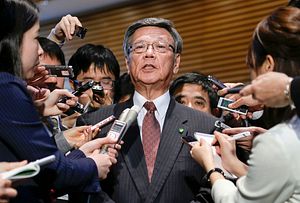Takeshi Onaga, who as governor of Okinawa led a campaign to reduce the U.S. military presence on the islands, passed away at a hospital in Urasoe on August 8. He had been struggling with stage 2 pancreatic cancer.
Onaga was elected governor in November 2014 on a pledge to block plans to relocate a U.S. Marine Corps air station in Futenma, Ginowan, to Henoko, Nago, a less dense part of the island. Since he took office, Onaga filed a series of lawsuits against the Japanese government, seeking a court injunction to stop landfill at the planned relocation site in Henoko. In December 2016, the Japanese Supreme Court ruled against Onaga’s decision to withdraw his predecessor’s approval of the current Futenma relocation plan. In April 2017, the Japanese government finally began the construction of a new base. Until recently, Onaga was preparing another legal action in order to make the original approval invalid from its inception.
In addition to the unsuccessful legal battles, the political climate in Okinawa has not necessarily been in favor of Onaga and his political allies of anti-base movements. At the local level, anti-base candidates have lost in most key elections including Ginowan, Urasoe, Uruma, Miyakojima, Yaese, Ishigaki, and Okinawa city. In February 2018, the incumbent Nago mayor Susumu Iwamine, who received strong support from Onaga and anti-base movement, was defeated by a challenger who was endorsed by pro-Henoko relocation forces. After a series of electoral defeats, a pro-Onaga conservative group departed from an anti-base movement led by liberal forces in May.
The gubernatorial election in Okinawa was originally scheduled for November, but due to the governor’s death, it is now expected to take a place sometime in late September. Ginowan mayor Atsushi Sakima announced his candidacy for governor of Okinawa last month, and Sakima has secured strong support from a pro-Henoko relocation forces in Okinawa as well as the Japanese government. We do not know yet who will run for the governorship with support of the anti-U.S. base political forces.
Is it possible for the anti-base groups to find a unifying candidate such as Onaga in 2014, one who could build a coalition including former Liberal Democratic Party members and the communists? Will the Okinawans continue to support the confrontational Onaga approach to Tokyo or express a desire to focus more on job creation and socioeconomic issues, including the shortage of preschools as the recent local elections have demonstrated in Okinawa?
For the pro-Henoko relocation forces, it will be a great opportunity to retake the governor’s office once again. More importantly, the consensus in all political levels from the local Henoko district, to Nago city, Okinawa prefecture, and up to Tokyo could be rebuilt by the pro-Henoko relocation forces for the first time since the Democratic Party of Japan-led Yukio Hatoyama government broke this fragile and complex balance among Japanese domestic forces in 2009.
The people of Okinawa will have a chance to express their opinion once again in late September. Regardless of the electoral results, the sustainable and mutually beneficial relationship among Okinawa, Tokyo, and the United States will continue to be a priority to all parties involved, as long as the U.S.-Japan alliance remains effective under the growing security uncertainty in the Indo-Pacific.
Dr. Aki Nakai is an adjunct faculty in the Pardee School of Global Studies at Boston University and the Political Science Program at Lesley University

































